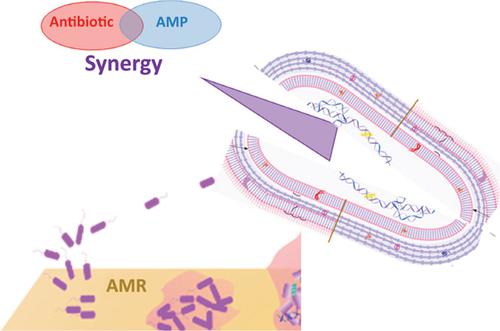Current Topics in Medicinal Chemistry ( IF 3.4 ) Pub Date : 2020-05-01 , DOI: 10.2174/1568026620666200303122626 Jiarui Li 1 , Pablo Fernández-Millán 1 , Ester Boix 1

|
Background: Antimicrobial resistance (AMR) to conventional antibiotics is becoming one of the main global health threats and novel alternative strategies are urging. Antimicrobial peptides (AMPs), once forgotten, are coming back into the scene as promising tools to overcome bacterial resistance. Recent findings have attracted attention to the potentiality of AMPs to work as antibiotic adjuvants.
Methods: In this review, we have tried to collect the currently available information on the mechanism of action of AMPs in synergy with other antimicrobial agents. In particular, we have focused on the mechanisms of action that mediate the inhibition of the emergence of bacterial resistance by AMPs.
Results and Conclusion: We find in the literature many examples where AMPs can significantly reduce the antibiotic effective concentration. Mainly, the peptides work at the bacterial cell wall and thereby facilitate the drug access to its intracellular target. Complementarily, AMPs can also contribute to permeate the exopolysaccharide layer of biofilm communities, or even prevent bacterial adhesion and biofilm growth. Secondly, we find other peptides that can directly block the emergence of bacterial resistance mechanisms or interfere with the community quorum-sensing systems. Interestingly, the effective peptide concentrations for adjuvant activity and inhibition of bacterial resistance are much lower than the required for direct antimicrobial action. Finally, many AMPs expressed by innate immune cells are endowed with immunomodulatory properties and can participate in the host response against infection. Recent studies in animal models confirm that AMPs work as adjuvants at non-toxic concentrations and can be safely administrated for novel combined chemotherapies.
中文翻译:

宿主防御肽和抗细菌感染抗生素之间的协同作用。
背景:对常规抗生素的抗药性(AMR)成为全球主要的健康威胁之一,并且正在寻求新的替代策略。曾经被遗忘的抗菌肽(AMPs)作为克服细菌耐药性的有前途的工具正在重新出现。最近的发现吸引了人们对AMPs作为抗生素佐剂的潜力的关注。
方法:在这篇综述中,我们试图收集有关AMP与其他抗菌剂协同作用的作用机制的当前可用信息。特别地,我们集中于介导AMPs抑制细菌耐药性出现的作用机理。
结果与结论:我们在文献中发现许多AMP可以显着降低抗生素有效浓度的例子。肽主要在细菌细胞壁起作用,从而促进药物接近其细胞内靶标。补充地,AMPs也可有助于渗透生物膜群落的胞外多糖层,甚至防止细菌粘附和生物膜生长。其次,我们发现其他可以直接阻止细菌耐药机制出现或干扰社区群体感应系统的肽。有趣的是,用于佐剂活性和抑制细菌抗性的有效肽浓度远低于直接抗菌作用所需的浓度。最后,先天免疫细胞表达的许多AMP具有免疫调节特性,并且可以参与宿主抵抗感染的反应。最近在动物模型中的研究证实,AMPs在无毒浓度下可作为佐剂使用,可以安全地用于新型联合化学疗法。


























 京公网安备 11010802027423号
京公网安备 11010802027423号